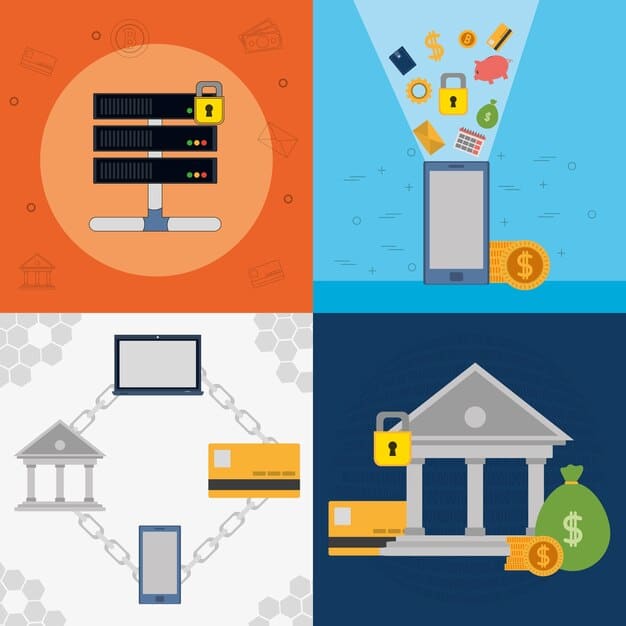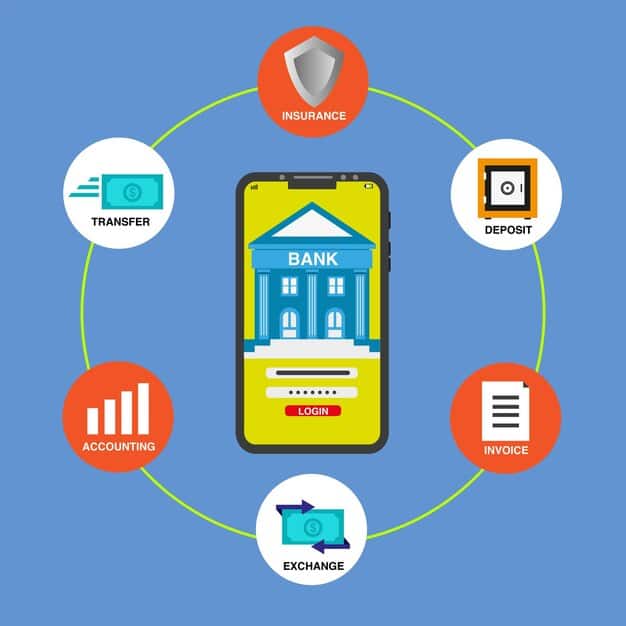Open Banking APIs: Fueling Fintech Startup Growth in the US

Open Banking APIs empower fintech startups in the US by providing secure access to customer banking data, enabling them to create innovative financial products and services, personalize customer experiences, and drive significant growth.
In today’s dynamic financial landscape, Open Banking APIs: How Fintech Startups Can Leverage Them for Growth in the US Market is becoming increasingly crucial. These APIs are acting as powerful catalysts, enabling fintech startups to innovate, compete, and scale within the US market.
Understanding Open Banking APIs
Open Banking is a banking practice that allows third-party financial service providers to access consumer banking, transaction, and other financial data from banks and financial institutions through the use of application programming interfaces (APIs). For fintech startups, understanding and leveraging these APIs is fundamental for growth in the US market.
What is Open Banking?
Open Banking envisions a financial ecosystem where data is shared securely and efficiently, enabling innovation and improved customer experiences. It’s a shift from traditional, closed banking systems to more collaborative and transparent models.
The Role of APIs
APIs act as the conduits through which data flows in Open Banking. They provide a standardized way for fintechs to access banking information, subject to customer consent, without requiring direct access to sensitive systems.
Here are some key benefits of understanding the role of APIs:
- Enhanced product development.
- Improved customer experiences.
- Faster time to market.
- Reduced operational costs
The rise of Open Banking is directly correlated with the maturation and adoption of APIs. Fintechs that grasp this connection gain a competitive edge.
In essence, Open Banking APIs are the building blocks for a new wave of financial innovation, offering fintech startups unprecedented access and opportunities to reshape the financial landscape.

Benefits of Open Banking for Fintech Startups
For fintech startups, the advantages of utilizing Open Banking extend far beyond mere data access, creating a foundation for sustainable growth and competitive advantage within the US market. These benefits enable them to operate more efficiently, offer more personalized services, and reach a wider audience.
Accelerated Innovation
Open Banking APIs allow startups to quickly prototype and launch new products and services by leveraging existing banking infrastructure and data. This eliminates the need to build everything from scratch, significantly reducing time-to-market.
Personalized Customer Experiences
Access to banking data allows fintechs to create highly personalized financial solutions tailored to individual customer needs. This can range from customized budgeting tools to personalized loan offerings.
Key benefits in using customer experiences include:
- Increased customer engagement and loyalty.
- Data-driven decision-making.
- Improved customer satisfaction.
- Higher customer retention rates.
By understanding and acting upon customer preferences, fintechs can build stronger relationships and deliver superior value.
In summary, the benefits of Open Banking APIs significantly enhance the capabilities of fintech startups, empowering them to innovate, deliver personalized services, and compete effectively in the rapidly evolving financial industry.
Use Cases for Open Banking APIs
Open Banking APIs unlock a wide array of innovative applications for fintech startups in the US, revolutionizing how financial services are delivered and experienced. By leveraging these APIs, startups can create solutions that address a variety of customer needs and improve financial outcomes.
Personal Finance Management
Fintechs can use APIs to aggregate bank account information, track spending patterns, and provide personalized budgeting advice, empowering users to better manage their finances.
Streamlined Lending Processes
APIs enable faster and more accurate credit risk assessments by providing real-time access to banking data, leading to quicker loan approvals and better lending decisions. Real-time insights into an applicant’s financial behavior allow for more precise scoring and customized loan products, ultimately reducing risk and improving access to credit for consumers and small businesses.
These are different elements than can be used from APIs:
- Real-time transaction analysis.
- Automated credit scoring.
- Personalized loan rates and terms.
- Reduced loan processing times.
Open Banking APIs are transforming the lending landscape, enabling greater efficiency, transparency, and accessibility for both lenders and borrowers.

Challenges and Considerations
While Open Banking APIs offer significant opportunities, fintech startups must also navigate several challenges and considerations to ensure responsible and sustainable growth within the US market. Addressing these challenges proactively is crucial for building trust and maintaining compliance.
Data Security
Protecting sensitive financial data is paramount. Fintechs must implement robust security measures to prevent data breaches and unauthorized access. By leveraging advanced encryption, multi-factor authentication, and continuous monitoring, fintechs can create a secure environment that protects user data and builds trust.
Regulatory Compliance
Navigating the complex landscape of US financial regulations is crucial. Fintechs must comply with all applicable laws and regulations, including data privacy and consumer protection laws.
- Staying informed about regulatory changes.
- Implementing robust compliance programs.
- Seeking expert legal advice.
Consumer Privacy
Obtaining explicit consent from consumers before accessing their banking data is essential. Fintechs must be transparent about how they use data and provide consumers with control over their information. Open communication and clear privacy policies can foster transparency and give users confidence in how their data is managed.
By addressing the challenges and considerations head-on, fintech startups can build a secure, compliant, and consumer-centric Open Banking ecosystem that drives innovation and delivers value to all stakeholders.
Best Practices for Leveraging Open Banking APIs
To maximize the value of Open Banking APIs, fintech startups should adhere to a set of best practices that promote efficiency, security, and a positive user experience. These practices help ensure that APIs are integrated effectively, data is handled responsibly, and customer needs are met.
Prioritize Security
Implement strong authentication and authorization mechanisms to protect against unauthorized access. Regularly audit security protocols to identify and address vulnerabilities. Employing techniques like tokenization, encryption, and continuous monitoring can dramatically reduce the risk of data breaches.
Focus on User Experience
Design intuitive and user-friendly interfaces that make it easy for customers to understand and control their data sharing preferences.
These elements are keys to creating a better UX:
- Streamlined onboarding processes.
- Clear and concise data usage explanations.
- Easy-to-manage consent settings.
Choose the Right APIs
Select APIs that align with your business goals and provide the functionality you need. Evaluate API documentation, developer support, and reliability before integrating them into your platform. Conducting thorough research and testing can prevent compatibility issues and performance bottlenecks down the line.
Following these best practices will help fintech startups harness the full potential of Open Banking APIs, fostering innovation, building customer trust, and achieving sustainable growth in the US market.
The Future of Open Banking in the US
As Open Banking continues to evolve, its impact on the US financial services landscape will only intensify. Fintech startups that embrace this trend and strategically leverage Open Banking APIs will be well-positioned to thrive in the years to come. The future of Open Banking is bright, full of innovation and opportunities that will reshape the financial experience for consumers and businesses alike.
Increased Collaboration
Expect to see more collaboration between banks and fintechs, with APIs serving as the foundation for new partnerships and integrated services.
Expansion of Use Cases
Open Banking APIs will likely be used in a wider range of applications, including insurance, investment management, and real estate.
These are some examples:
- AI-powered financial advisors.
- Automated insurance underwriting.
- Personalized real estate financing solutions.
Regulatory Clarity
As Open Banking matures, regulators are expected to provide clearer guidelines and standards, fostering greater certainty and innovation in the market.
Ultimately, the future of Open Banking in the US is one of increased innovation, collaboration, and customer empowerment. Fintech startups that embrace this trend are poised to lead the way in shaping the next generation of financial services.
| Key Point | Brief Description |
|---|---|
| 🔑 Open Banking APIs | Enable secure access to banking data for fintech innovation. |
| 🚀 Accelerated Innovation | Quickly prototype and launch new financial products. |
| 🔒 Data Security | Implement robust measures to protect user financial data. |
| ⚖️ Regulatory Compliance | Adhere to US financial laws for sustainable growth. |
Frequently Asked Questions
▼
Open Banking APIs are interfaces that allow third-party financial service providers to securely access customer banking data with their consent, fostering innovation in financial products and services.
▼
They enable faster innovation, personalized customer experiences, and reduced operational costs by leveraging existing banking infrastructure and data.
▼
Challenges include ensuring data security, complying with regulations, and protecting consumer privacy while maintaining a user-friendly interface.
▼
Implementing robust security measures, such as encryption, multi-factor authentication, and regular audits, can help protect against data breaches and unauthorized access.
▼
The future includes increased collaboration between banks and fintechs, expansion of use cases in various financial sectors, and clearer regulatory guidelines to foster innovation.
Conclusion
Open Banking APIs: How Fintech Startups Can Leverage Them for Growth in the US Market provide a powerful set of tools for fintech startups to innovate and grow. By understanding the benefits, addressing the challenges, and following best practices, these startups can leverage APIs effectively to create value for their customers and succeed in the evolving financial landscape. The future of fintech in the US is inextricably linked to the strategic adoption and intelligent implementation of Open Banking APIs.





